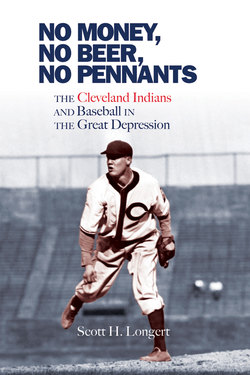No Money, No Beer, No Pennants

Реклама. ООО «ЛитРес», ИНН: 7719571260.
Оглавление
Scott H. Longert. No Money, No Beer, No Pennants
Отрывок из книги
No Money, No Beer, No Pennants
The Cleveland Indians and Baseball in the Great Depression
.....
By early November the remaining stockholders from the Dunn era had been whittled down to one. The lone holdout was W. J. Garvey from Chicago. Mr. Garvey wanted double the price of the Bradley group offer. The men went back and forth with the obstinate Garvey, who refused to budge on his 156 shares. Ernest Barnard, now the president of the American League, kept in touch with the old stockholder, trying to dissuade him from blocking the sale. On November 15, 1927, Barnard telephoned Bradley to let him know the final roadblock had been removed: Garvey had agreed to part with his stock. The next day, newspapers from Seattle to Boston reported that the Cleveland Indians had been sold.
When the details of the sale were released it came as a surprise that Alva and Chuck Bradley only controlled 18 percent of the total stock. There was ample money in the Bradley fortune to purchase a considerably larger share of the club. For reasons not mentioned, the brothers chose to keep their investment a conservative one. Alva was the driving force behind the sale, yet he would be only a minority shareholder. Percy Morgan bought 20 percent of the stock while John Sherwin acquired 30. Other Clevelanders, including attorney Joseph Hostetler and former secretary of war Newton Baker, bought up the remaining shares in varied amounts. When officers were named, Alva Bradley became president and treasurer of the Cleveland baseball club. Percy Morgan would be the vice president. The new owners all agreed that Bradley was the decision maker and spokesperson for the group. The job of rebuilding the Cleveland Indians rested on his shoulders.
.....